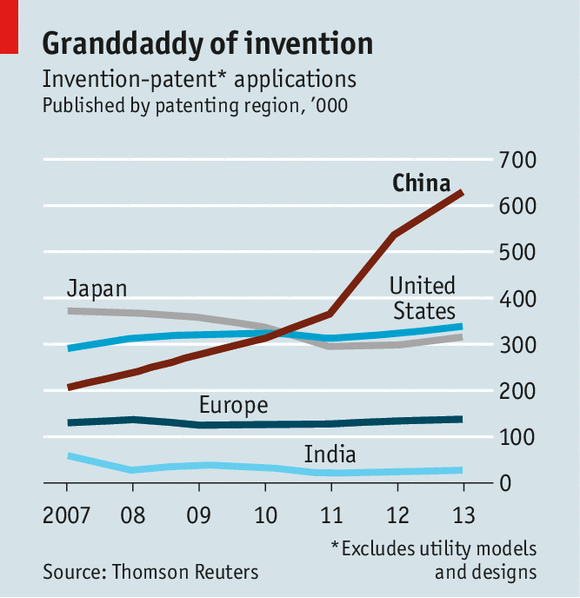
“WHAT has long been predicted has now become a reality: China is leading the world in innovation.” So declares a press release promoting a new report by Thomson Reuters, a research firm, called “China’s IQ (Innovation Quotient)”. The report highlights the astonishing increase in patents filed in the country. In 2010 Chinese firms filed roughly the same number of applications for “invention” patents (the most rigorous sort) as their counterparts in Japan and America. By 2013 the Chinese figure had nearly doubled even as the rates in the other two countries held steady (see chart).
Some scepticism is in order, however. For one thing, the explosion of patent filings is not the result of local researchers suddenly coming up with twice as many ingenious inventions: it is a response to a government order. As the report acknowledges, “the growth in output is driven by the 12th Five-Year Plan and the associated Chinese National Patent Development Strategy”. Bureaucrats have decreed that local firms will apply for 2m patents by 2015. Thanks to various subsidies and incentives, China looks set to hit that target.
The quality of many of these patents is in doubt. Of the desired 2m filings, many will be for “utility” or “design” patents, which are less substantial than “invention” patents. Critics suggest that even in the latter category, many Chinese filings fall short of global standards.
That is why it is useful to see what percentage of Chinese invention patents are also filed at foreign patent offices, which tend to be more rigorous and transparent. (When a firm goes to the trouble of filing for patents globally, it is usually a sign that it believes its invention to be genuinely valuable.) Only about 5% of patents filed by local firms in China last year were also filed abroad, whereas over a third of patents originally filed by local firms in Japan were also filed elsewhere.
Almost all of the growth in China’s invention patents over the past three years has come from local firms, not from the Chinese divisions of multinationals. That suggests that the bureaucrats’ orders are responsible, rather than the emergence of a local ecosystem of innovation as seen in Silicon Valley. Intellectual-property rights do matter, but merely churning out patents does little to advance innovation.
http://www.economist.com/news/finance-and-economics/21636100-are-am...



You need to be a member of PakAlumni Worldwide: The Global Social Network to add comments!
Join PakAlumni Worldwide: The Global Social Network